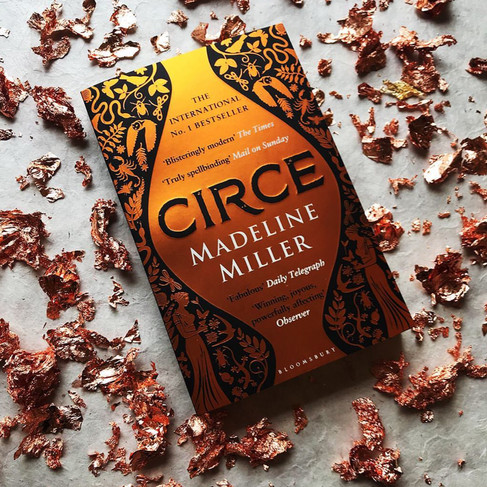Women Written by Women: The Greek Myths
- Caroline Hamar

- Mar 26, 2025
- 4 min read
As 2025 unfolds, I've discovered a cherished nighttime ritual: immersing myself in tales of Greek mythology before sleep. These stories, with their intricate tapestry of goddesses, sorceresses, and royal women, have been masterfully reimagined by modern authors who gift their ancient heroines not just with agency and vindication, but with something deeper – a profound humanity often absent from their original divine portrayals. In these retellings, immortal beings wrestle with the most intimate of human experiences: love, doubt, loneliness, and triumph. Their stories, though wrapped in supernatural splendor, pulse with achingly familiar emotions.
As I drift toward sleep, these narratives seep into my consciousness, their threads weaving through my own dreams. I find myself transported to sun-dappled Mediterranean waters, walking through marble-columned citadels that gleam against azure skies, and wandering through shadowed labyrinths where ancient creatures lurk. In these moments between wakefulness and sleep, the boundary between myth and imagination blurs, creating a realm where ancient stories feel startlingly alive and present.
Madeline Miller's "Circe" (2018) is a masterful feminist retelling of the story of the infamous sorceress from Homer's Odyssey. Miller, a classics scholar with a background in teaching Greek and Latin, spent a decade crafting this novel that transforms a traditionally villainous character into a complex, nuanced protagonist.
The novel follows Circe, daughter of the sun god Helios and the nymph Perse, from her birth through centuries of immortal life. Born without the powers of her divine family, Circe discovers her true strength in pharmakeia (witchcraft), leading to her exile to the island of Aiaia. There, she develops her craft, encounters various mythological figures, and eventually meets Odysseus – though their relationship is portrayed very differently from Homer's account.
What makes this work particularly notable is Miller's ability to weave together numerous Greek myths while maintaining a cohesive narrative focused on Circe's personal growth. The author draws from various ancient sources but creates something entirely new, exploring themes of immortality versus humanity, the nature of divinity, and female agency in a male-dominated world.
The novel's most compelling aspect is its exploration of transformation – both literal, through Circe's famous ability to turn men into pigs, and metaphorical, through her journey from insecure nymph to powerful witch. Miller's prose is both lyrical and accessible, bringing ancient mythology into sharp contemporary focus while maintaining the mythic atmosphere of the original tales.
"Circe" garnered numerous accolades, including shortlisting for the Women's Prize for Fiction, and sparked renewed interest in feminist retellings of classical myths. Its success lies in Miller's ability to humanize an immortal figure while examining timeless themes of power, isolation, love, and the price of choosing one's own path.
Bettany Hughes's "Helen of Troy" (2005) stands out as a scholarly yet engaging historical investigation into one of mythology's most enigmatic figures. Hughes, a respected historian and broadcaster, approaches her subject not just as a mythological character but as a cultural phenomenon that has influenced art, literature, and society for millennia.
Unlike fictional retellings, this work is a thorough historical analysis that examines archaeological evidence, ancient texts, and cultural artifacts to understand both the historical reality of Bronze Age Greece and the evolution of Helen's story through time. Hughes takes readers on a journey from the palaces of Mycenaean Greece to the present day, exploring how Helen's image has been shaped and reshaped to reflect changing attitudes toward women, power, and beauty.
What makes this work particularly fascinating is Hughes's ability to balance academic rigor with accessible storytelling. She examines Helen's story through multiple lenses: archaeological findings from Bronze Age Greece, literary analysis of ancient texts, and the historical context of women's roles in ancient societies. The book also explores how Helen's character has been reinterpreted throughout history, from ancient Greece to modern times.
The work's central themes include the nature of female agency in patriarchal societies, the relationship between beauty and power, and how societies create and maintain cultural myths. Hughes also examines how Helen's story has been used to justify or criticize various social and political movements throughout history.
Notable for its comprehensive approach, the book won several academic accolades and has become a standard reference work for both scholars and general readers interested in classical studies. Hughes's work stands out for its ability to bridge the gap between academic research and popular history.
Jennifer Saint's "Ariadne" (2021) offers a compelling feminist retelling of the Cretan princess's story, traditionally known for her role in helping Theseus defeat the Minotaur. Saint, a former high school teacher of classics, brings fresh perspective to this often-overlooked character from Greek mythology.
The novel primarily follows Ariadne's life from her experiences in Crete through her abandonment on Naxos and subsequent relationship with Dionysus. Saint's narrative also weaves in the story of Ariadne's sister Phaedra, creating a complex exploration of sisterhood, betrayal, and the different ways women navigate power structures in the ancient world.
What makes this work particularly interesting is Saint's attention to the psychological complexity of her characters and her exploration of the consequences of heroic actions. The novel questions traditional heroic narratives, particularly examining the cost of male heroism on the women who enable it. Saint's portrayal of Dionysus is especially nuanced, showing both the allure and danger of the god's wild nature.
The book explores themes of female agency and sacrifice, the cyclical nature of violence, and the contrast between mortal and divine love. Saint's writing style combines classical elements with modern psychological insights, making the ancient myth accessible to contemporary readers while maintaining its mythological gravity.
"Ariadne" has been particularly praised for its exploration of sisterhood and female relationships, as well as its unflinching examination of the dark aspects of Greek mythology. The novel contributes to the growing body of feminist retellings of classical myths, offering a perspective that centers women's experiences in traditionally male-dominated narratives.











Comments